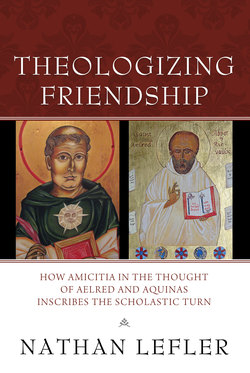Читать книгу Theologizing Friendship - Nathan Sumner Lefler - Страница 5
На сайте Литреса книга снята с продажи.
Preface
ОглавлениеThe following work constitutes a lightly edited version of my dissertation, originally defended in 2008. As the project is anchored in a comparison of the writings of two men whose floruits were many centuries ago, I have not deemed it necessary to update the essentially speculative argument derived from my original analysis: though there has been a good deal of work done on each author over the past several years and some work drawing Aelred and Aquinas into the same ambit under one rubric or another, no one that I know of has placed their thinking on friendship head to head in an extended discussion, much less as an entrée into the comparative evaluation of monastic and scholastic theology. There is a further, positive reason for leaving my original argument essentially as-is, namely, that, as the reader shall see in my introduction, I deliberately draw attention to the genre of the dissertation, noting some of the implications of that form for academic discourse and proposing to engage that form in my own case in what may be deemed somewhat problematic ways, at any rate according to the canons of modern scientific discourse. Whether the outcome is beneficial or deleterious to the common good is for the reader to decide.
The dissertation investigates the theological accounts of friendship offered by Aelred of Rievaulx and Thomas Aquinas, compares these accounts, and applies this localized comparison as an index of the relationship between monastic and scholastic theology in general.
Through close reading of the key texts in which the subject of friendship is treated, Aelred’s Speculum caritatis and De spiritali amicitia and Thomas’s Summa Theologiae, the two authors are found to epitomize their different theological milieux, the monastic and the scholastic respectively. This judgment pertains as much to the content of the two accounts as it does to the form. Thus, not only each author’s theological approach, but his distinctive understanding of friendship itself, proves to be profoundly congruent with his spiritual-theological matrix, whether twelfth-century monasticism on the one hand, or thirteenth-century scholasticism on the other.
In fact, a loose, tripartite analogy may be seen to obtain among friendship, reading and theology in the monastic milieu, while a parallel analogy is to be found, mutatis mutandis, in the scholastic realm. Taking due care to demonstrate this relationship according to the rigors of comparative textual analysis, the earnest effort is made at the same time not to minimize the heterogeneity of the texts and theological perspectives in question. Granting Jean Leclercq’s wise dictum that the Church has but “one theology,” we recognize as well the risk of misconstruing that theological unity as monolithic.
In short, monastic theology, like monastic friendship according to the exemplary account of Aelred of Rievaulx, is ideally a balanced activity of reason and will, profoundly Christ-centered, existentially grounded in both sensible and spiritual experience, and quintessentially expressed in the perfect union of will and ideas between the persons involved. Scholastic theology, on the other hand, seeks to elucidate as clearly as possible both nature and supernature and the relation between them, in the bright light of natural reason, yet simultaneously elevated by the brighter light of supernatural grace. In doing so, the enterprise strongly resembles Thomas’s notion of friendship as the ideal relation between God and man.
